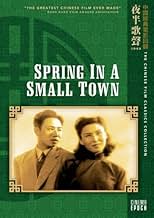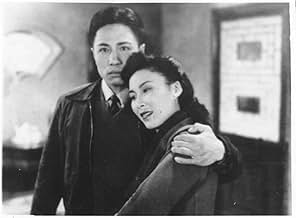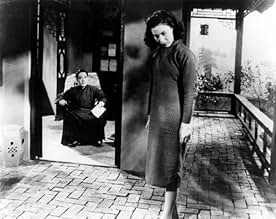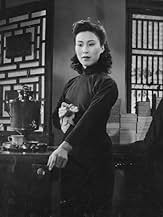IMDb RATING
7.3/10
3.6K
YOUR RATING
A lonely housewife finds her monotonous life altered when her childhood sweetheart returns to town.A lonely housewife finds her monotonous life altered when her childhood sweetheart returns to town.A lonely housewife finds her monotonous life altered when her childhood sweetheart returns to town.
- Awards
- 1 win total
- Director
- Writer
- All cast & crew
- Production, box office & more at IMDbPro
Featured reviews
Very interesting to get this glimpse into China in the short interval after WWII and before the communists won the Civil War. We see the fashions of the period pre-communism and a story decidedly not in keeping with social realism or rosy propaganda; instead, these characters have real angst and it's a human tale ala Madame Bovary. The devastation of the country is mirrored in the ruins of the town and in the illness of a man (Yu Shi) living with his increasingly estranged wife (Wei Wei). She's dutiful to him, but the pair are no longer intimate or even in love. Enter her old lover (Li Wei), a doctor who somehow slipped away from her a few years ago, and an illicit love triangle secretly begins simmering.
I loved the first half of the film, where the conflict and desire is told through glances and silences, and it wasn't clear what would happen. Complicating matters (in a good way) is the presence of a cheery 16-year-old sister who is also a possible love interest for the doctor. The film is a little creaky but director Fei Mu gives us some wonderful shots along the old city walls, the breeze fluttering through the grasses as the lovers stir each other's desires. The pace bogs down a little bit as the characters search for resolution to the struggle, with various contemplations of withdrawal, suicide, and even murder. The lovers also go through cycles which represents their torment, e.g. in a moment of passion the doctor whisking the woman off her feet and into his arms, and in the very next, putting her down, walking out the door and locking it. In all of the melodrama it seemed to me the story-telling wasn't as clean as it could have been, and I wasn't as swept up in the emotions of the ending as much as a result. It's interesting to think about the understated emotion and restraint here as it compares to 'In the Mood for Love' (2000) though, and the two films might make an interesting double feature.
I loved the first half of the film, where the conflict and desire is told through glances and silences, and it wasn't clear what would happen. Complicating matters (in a good way) is the presence of a cheery 16-year-old sister who is also a possible love interest for the doctor. The film is a little creaky but director Fei Mu gives us some wonderful shots along the old city walls, the breeze fluttering through the grasses as the lovers stir each other's desires. The pace bogs down a little bit as the characters search for resolution to the struggle, with various contemplations of withdrawal, suicide, and even murder. The lovers also go through cycles which represents their torment, e.g. in a moment of passion the doctor whisking the woman off her feet and into his arms, and in the very next, putting her down, walking out the door and locking it. In all of the melodrama it seemed to me the story-telling wasn't as clean as it could have been, and I wasn't as swept up in the emotions of the ending as much as a result. It's interesting to think about the understated emotion and restraint here as it compares to 'In the Mood for Love' (2000) though, and the two films might make an interesting double feature.
This is a film about deep and unspoken human relationships.
Eventually they do become spoken, but is there a chance to change anything about the situation.
Originally made in Shanghai 1948 and quite free of propaganda the film introduces us to the Dai Family. There is still some weight about the history that surrounds the family. History usually has weight in Chinese literature and serious film.
A young married couple - Liyan, an invalid, and his wife Yuwen live in a once great family compound that is partially ruined.
A bright contrast is Liyan's young sister who cannot really remember the past of the family but accepts everything in quite a natural way. Her spirit is as bright as the other two are reserved.
Into this apparently stable world comes an unexpected visitor...
I ended up feeling quite sad - but definitely a superior film.
Eventually they do become spoken, but is there a chance to change anything about the situation.
Originally made in Shanghai 1948 and quite free of propaganda the film introduces us to the Dai Family. There is still some weight about the history that surrounds the family. History usually has weight in Chinese literature and serious film.
A young married couple - Liyan, an invalid, and his wife Yuwen live in a once great family compound that is partially ruined.
A bright contrast is Liyan's young sister who cannot really remember the past of the family but accepts everything in quite a natural way. Her spirit is as bright as the other two are reserved.
Into this apparently stable world comes an unexpected visitor...
I ended up feeling quite sad - but definitely a superior film.
After a long war with Japan, Chinese society in 1948 was ravaged by the destruction and the deaths of the seven straight years of the conflict. This movie perfectly depicts the depression of that era and the hopelessness in simple village-folk, while bringing a rather simplistic love triangle story-line at the forefront. Among the most important elements depicted are the internal monologues of Zhou Yuwen (Wei Wei), which narrate her life and bring a unique proto-feminist perspective within a society that was used to female subservience.
Film-making wise, noteworthy moments are the long walks along the ravaged (presumably by Japanese bombs) wall, as well as, the completely silent scenes that happen along the way, that add to the eeriness of the movie.
Film-making wise, noteworthy moments are the long walks along the ravaged (presumably by Japanese bombs) wall, as well as, the completely silent scenes that happen along the way, that add to the eeriness of the movie.
Xiao Chen Zhi Chun is a great movie, not only in the year it was shot but also now. It's an art movie which is not outdated even in 21st century. The director maintained a good narrative skill and thus made the story so smooth!
The movie reminds me of the later French new wave movie: Francois Truffaut's "Femme d'a cote" which is of the similar topic.
The movie reminds me of the later French new wave movie: Francois Truffaut's "Femme d'a cote" which is of the similar topic.
If you are looking for a slice of life movie, look no further. A word of caution, however: this movie is a story, and a child of its time. There is no spectacular camera work, no epic soundtrack (or sound at all, for the most part), and certainly no special effects. Even the acting and dialogues are passable, at best. If you need any of these things to be immersed or even enjoy a movie, Spring in a Small Town is not for you.
There are four characters in the movie (and I mean four, there are no other supporting cast members or extras). The first two we are introduced are a couple, and they are "content". This is he best word to describe their situation, for they are not happy nor sad. You quickly realize that they have been frozen in time for years.
The conflict is created when an old friend (of both) comes back to town. This establishes the classic love triangle: the old friend has feelings for the wife, and she is torn between her own feelings towards him (or what she believes them to be) and those towards her husband.
There is little more to say about this movie without spoiling, except reiterate that this is a Chinese movie from the 40's. This is very much removed from the "factory assembled" plot lines that have plagued movies/books/video games/series for a long time.
If you were keeping track, the fourth character is the couple's caretaker, and he is a supporting character.
In the end, i still walk away with a lesson: no matter how much we think our life will stay the same, things will always happen. Whether they create change or not, is up to us.
There are four characters in the movie (and I mean four, there are no other supporting cast members or extras). The first two we are introduced are a couple, and they are "content". This is he best word to describe their situation, for they are not happy nor sad. You quickly realize that they have been frozen in time for years.
The conflict is created when an old friend (of both) comes back to town. This establishes the classic love triangle: the old friend has feelings for the wife, and she is torn between her own feelings towards him (or what she believes them to be) and those towards her husband.
There is little more to say about this movie without spoiling, except reiterate that this is a Chinese movie from the 40's. This is very much removed from the "factory assembled" plot lines that have plagued movies/books/video games/series for a long time.
If you were keeping track, the fourth character is the couple's caretaker, and he is a supporting character.
In the end, i still walk away with a lesson: no matter how much we think our life will stay the same, things will always happen. Whether they create change or not, is up to us.
Did you know
- TriviaVoted the best Chinese-language film of all time by the Hong Kong Film Academy in 2004.
- Alternate versionsThere is an Italian edition of this film on DVD, distributed by DNA Srl: " PRIMAVERA IN UNA PICCOLA CITTÀ (Spring in a Small Town, 1948) + LA DEA (The Goddess, 1934)" (2 Films on a single DVD). The film has been re-edited with the contribution of film historian Riccardo Cusin. This version is also available for streaming on some platforms.
- ConnectionsFeatured in Venice 70: Future Reloaded: Zhangke Jia (2013)
- How long is Spring in a Small Town?Powered by Alexa
Details
- Release date
- Country of origin
- Language
- Also known as
- Proleće u malom gradu
- Production company
- See more company credits at IMDbPro
- Runtime
- 1h 38m(98 min)
- Color
- Sound mix
- Aspect ratio
- 1.37 : 1
Contribute to this page
Suggest an edit or add missing content

























